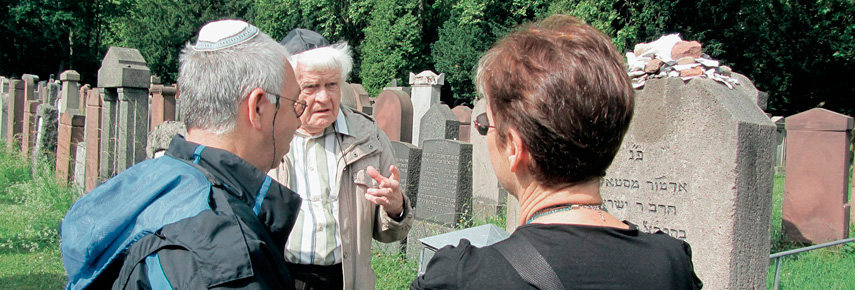BIOGRAPHICAL NOTES
Name:
Bertha Röder, née Kahn
Born:
1888 in Lichtenau/Baden
Marriage:
To Johann Jakob Röder, Old Catholic
Residence:
Oberursel
May 20, 1943 – Summoned by Gestapo
Imprisoned (Klapperfeldstraße and Gutleutstraße) and deported to Auschwitz in a special transport
Death in Auschwitz: October 19, 1943
Children:
- Richard (1917), Max (1919), Ernst (1920) and Alice (1921), “first-degree Mischlinge”
- 1940/1941 – Ernst and Max Röder are discharged from the army
- 1943 – Ernst Röder performs forced labor in Merseburg
- February 1945 – The three siblings are summoned for “interned labor in Theresienstadt”, but go underground
- Late 1940s – The brothers leave Oberursel
Sources (German):
• Hessisches Hauptstaatsarchiv Wiesbaden
• Interviews with Ernst, Max and Richard Röder, with Günther Röder and further eye-witnesses
• Private documents and fotos
• Rieber, A. (2004): Wir bleiben hier. Lebenswege Oberurseler Familien jüdischer Herkunft, Kramer-Verlag: Frankfurt
Images:
• Bertha Röder, Source: Röder family
• Bertha Röder with her children in February 1935, Source: Röder family
• Max Röder as a Wehrmacht soldier, Source: Röder family
• Army passport of Ernst Röder, discharged as a “half-Jew” in 1940, Source: Röder family
Text and Research:
Angelika Rieber
Translation:
Emal Ghamsharick
Bertha Roeder
“Keep me in good memory”
by Angelika Rieber
In the Vordertaunus region, many people lived in so-called “mixed marriages.” Some worked in Frankfurt, others had moved from Frankfurt to small towns in the Taunus foothills. The majority of Jewish partners were converts. The fates of these families are very dissimilar and depend on many factors. Civil servants, for example, experienced anti-Semitic discrimination right after Hitler’s election.
While men of Jewish ancestry who were arrested during the November pogroms 1938 mostly fled from Germany, most women stayed with their families. The “mixed marriage partners” were at first spared the deportations to extermination camps in 1941/42. However, the Frankfurt Gau, unlike other German district administrations, planned mass arrests specifically against “mixed marriage partners.” In 1943, the targets, like Bertha Röder, were summoned by the Gestapo. The authorities used random charges to gain a formal pretext.
She left without a word
Bertha Roeder was born into a Jewish family in Lichtenau/Baden in 1888. In 1917, the domestic worker married the locksmith Johann Jakob Roeder and moved with him to Siemensstrasse in Oberursel. They had four children. In 1933, a few months after Hitler’s inauguration, Bertha Roeder’s husband died.
Bertha Roeder received a summons from the Gestapo in Frankfurt on May 20, 1943, ordering her to report four days later. Her son Richard Roeder remembers exactly how his mother told the children nothing about the Gestapo letter for days. At last, she informed her children and asked them not to tell anybody, the younger brother Ernst remembers. She left without a word. Richard Roeder accompanied his mother to Frankfurt – without luggage, because the family hoped, Bertha Roeder would return home after the interrogation.
But she was imprisoned and taken to the remand prison at Klapperfeldstrasse, later to Gutleutstrasse. The children were allowed to bring fresh laundry on Mondays, but not to speak to their mother. Richard Roeder only caught a glimpse when exiting the prison one day. He heard his name, turned around and saw his mother at the window shortly. It was the last time.
Bertha Roeder spent three months imprisoned in Frankfurt before being deported to Auschwitz in a special transport in September 1943. Her son recalls her final letter: “We are going to Auschwitz. God willing, I will come back. If not, keep me in good memory.”
Bertha Roeder did not come back. After hearing nothing for months, her children received a letter from camp headquarters informing them about their mother’s death.
“Your mother, Bertha Sara Roeder, née Cahn, born on Oct. 16, 1888, died on Oct. 19, 1943 due to general physical weakness at the local hospital. Her body has been incinerated at the state crematory. The death certificates are attached.
The Camp Commander”
“My mother knew; she sacrificed herself for us.” This was Ernst Roeder’s feeling. Her senseless death brought great grief. Photographs remind the brothers of their mother’s fate and keep her “in good memory.”
Discharged from the military
The “first-degree Mischlinge” also suffered discrimination and forced labor. At first, the young “half-Jews” were drafted until 1940, but according to the Military Act of 1935 (Wehrgesetz), they could not hold officer positions.
After a few weeks, however, the military service of Ernst Roeder and other “half-Jews” was finished. He was discharged 1940. Ernst’s brother Max stayed in the Wehrmacht until 1941 and even fought in Russia, until he too was “dishonorably” discharged. At first, the young men were insulted, but looking back they are glad, because it probably saved their lives.
The situation worsened, when half-Jews – unless employed in companies “essential to the war effort” or as manual laborers – were conscripted for forced labor. Ernst Röder was sent to Merseburg in 1943, where he performed hard labour alongside workers from various countries.
In February 1945, the remaining “Mischlinge”, such as Richard Roeder, were summoned for “interned labor in Theresienstadt”. Not knowing exactly what this could mean, the families suffered fear and sorrow. Aside from rumors about what happened in the camps, they knew of Jewish relatives who had been deported to concentration camps and never returned or “officially deceased”. The families had to choose whether to send away their young members. The Roeder siblings decided to go underground. They were supported by friends in the Reich Association of Non-Aryan Christians (Reichsverband nichtarischer Christen).
“It was a cold shower for me”
After Germany’s liberation, the siblings continued to live in Oberursel for a while, but then chose to leave the town. They were outraged at the “denazification culture”, where Nazis sought attestations from victims to whitewash their histories. Ernst Roeder wanted to leave Germany. “But I did not have the courage.” In their new surroundings, they kept silent about their past, fearing discrimination and odd reactions. Guenther Roeder was already of age 21 when he learned about his grandmother’s fate. His whole world collapsed. Today he learns about Jewish history and works for the realization of a Holocaust memorial in Oberursel.

